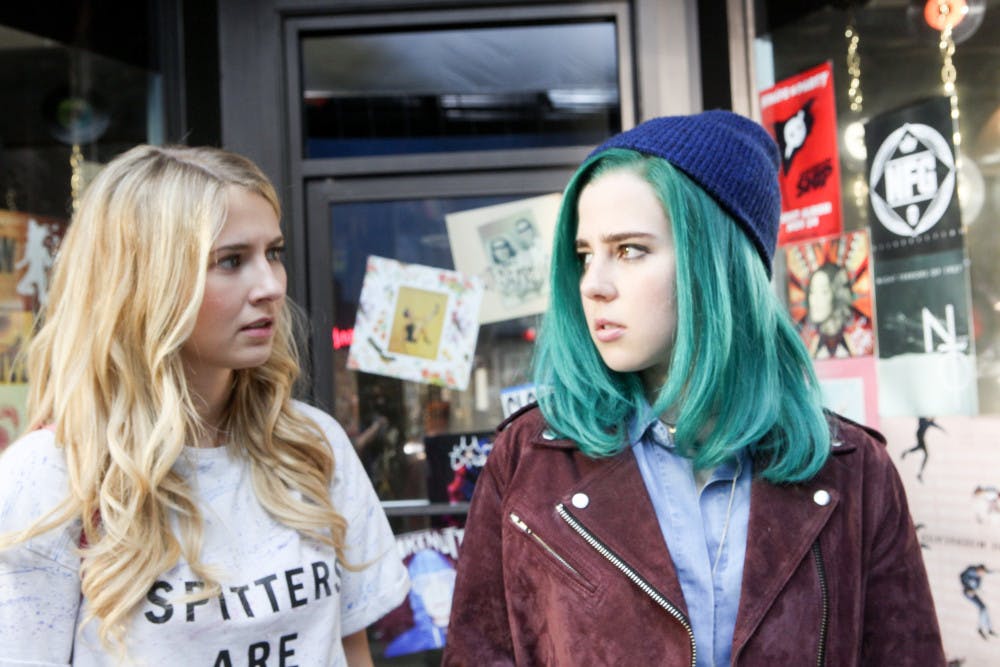“People are just getting away with awful things. I’m trying to make some of that right,” says protagonist Jules Thomas on MTV’s ongoing series “Sweet/Vicious.”
“Sweet/Vicious,” which premiered last November, tells the story of two typical college students — Jules , portrayed by Eliza Bennett, and Ophelia Mayer, portrayed by Taylor Dearden — who each take on a vengeful vigilante persona at night. Ophelia is a computer wizard and a green-haired outsider with perfect grades and a terrible attendance record. Jules is a popular sorority member hiding a secret alter ego and a painful past. Forging a unique friendship along the way, the girls join together to form a vigilante team that specializes in late-night ambushes of rapists on the school’s campus. The genre of the show is best described as an amalgamation of action, drama and comedy: a blend that is effective at times and less so at others, as is the show’s approach to discussing the hot-button topic of sexual assault.
Rape on college campuses is an extraordinarily relevant issue, and media centering on this subject has the potential to be meaningful and evocative. “Sweet/Vicious” encapsulates many aspects of such compelling media. Rather than blaming rape victims, “Sweet/Vicious” humanizes them. It holds perpetrators accountable and demonstrates that those who commit sexual assault do not all conform to a single profile. These are all important points, and “Sweet/Vicious” addresses them carefully and effectively.
Less commendable is the way in which the show reduces sexual assault to something that can be addressed simply via midnight violence, leg-stabbing, electrocution and even — spoiler alert — murder. Take the very first scene of the series: Jules, dressed as some kind of imitation ninja, crawls into a student’s dorm room, warns him — through a voice changer, of course — never to commit the act again, stabs him in the thigh and leaves without even retrieving the weapon. The whole scene comes across rather farcically; it is neither realistic nor tasteful, and espouses the idea that inflicting violence on another individual is the only way to settle the score. Sexual assault is more of a systemic, prevalent issue than a series of nighttime ambushes can resolve. While Ophelia and Jules are attacking rapists, their words intentionally echo those of the rapists themselves, something that may strike viewers as more uncomfortable than empowering.
Of course, this is a TV program about teenage vigilantes, and it’s not as though Batman is any less violent in fighting crime. Still, considering the show’s central theme bears such enormous relevance to student life on campuses today, it’s unfitting to talk about “Sweet/Vicious” in the same context as other superhero series. Things might be different if the protagonists had any sort of significant qualms about their actions — but they don’t, and that’s a problem.
But in terms of sheer entertainment value, “Sweet/Vicious” has its moments. The juxtaposition of lighthearted humor and darker scenes works well. Moreover, the humor is snappy, highly referential and very appropriate for its 21st-century audience.
As leads, Bennett and Dearden have lukewarm chemistry. Both fit their roles well — Ophelia’s snarky sarcasm is typical of a token “edgy teen” character, but Dearden delivers it so well that would-be bland lines are made humorous. The same goes for Jules’ wide-eyed naivete, which could be frustratingly saccharine if not for Bennett’s endearing delivery. Character relationships are another big plus. Jules and Ophelia’s partnership aside, it is heartwarming — and sometimes heartbreaking — to watch the interactions between Jules and her sorority sister Kennedy, portrayed by Aisha Dee. Their care for each other is so pure and authentic that it automatically boosts the quality of the show.
But the show also suffers from stereotypical side characters, plot line inconsistency between first season episodes and an admittedly ridiculous storyline, as Ophelia’s hacking prowess ensures that a timely deus ex machina is always in reach.
“Sweet/Vicious” does, at times, recognize its own implausibility. For example, in one scene, Ophelia asks Jules: “Who takes their bright pink sorority backpack to vigilante target practice?”— a very meta nod to the absurdity of the situation.
Maybe “Sweet/Vicious” tackles issues of sexual assault in an empowering way, or maybe such issues would be best addressed through other platforms. It’s up to the viewer to decide.





